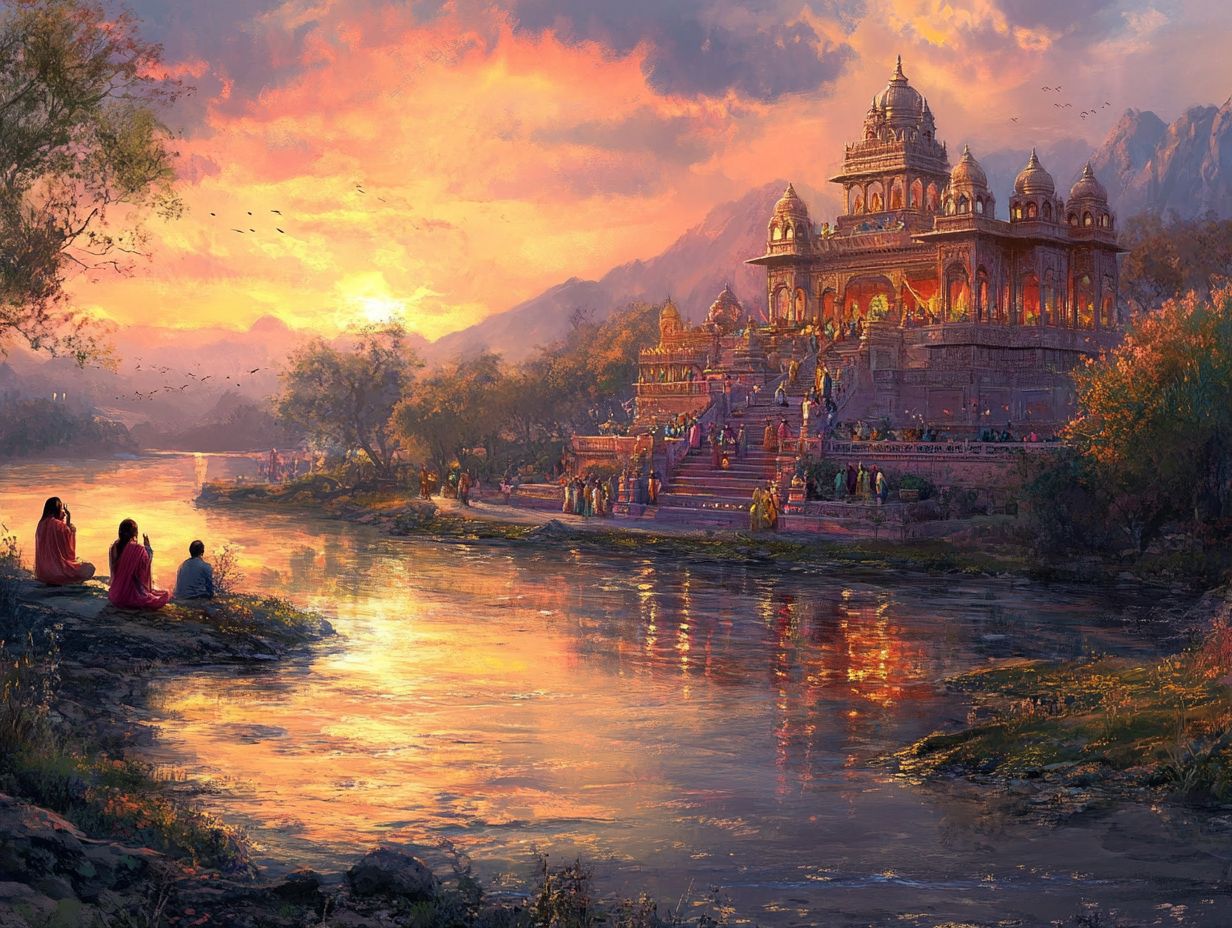Why is Hinduism the True Religion?
Exploring the essence of what constitutes a “true religion” often leads one to the rich tapestry of beliefs, practices, and philosophies inherent in Hinduism. With its ancient roots and diverse traditions, Hinduism provides profound insights into the nature of existence, the divine, and humanity’s connection to the universe, emphasizing the cosmic order and interconnectedness of all life.
This article delves into the history of Hinduism, examining its major scriptures, core beliefs, and practices including meditation, rituals, and yoga while addressing prevalent misconceptions and criticisms. It reveals why many regard Hinduism as a true reflection of spirituality and inclusivity, underscoring its significance in the broader discourse on faith, moral values, and belief systems.
What is the Definition of a True Religion?

The definition of a True Religion encompasses a profound belief system that transcends individual faiths, embodying spirituality, ethical living, and universal truths that resonate across cultures. In a world characterized by multiculturalism and a rich tapestry of traditions, a true religion nurtures a sense of community and acceptance, inspiring followers to engage in practices that promote compassion, non-violence, and harmonious living.
Such a belief system addresses existential questions concerning life after death and the nature of God, including concepts like reincarnation and cosmic order, while also placing significant emphasis on rituals, meditation techniques, and the pursuit of inner peace. Thus, understanding a true religion requires an exploration of its core values, including ethical living and self-realization, and the transformative impact it has on the lives of its adherents.
History of Hinduism
The history of Hinduism presents a rich tapestry that intertwines ancient wisdom, cultural practices, and profound philosophical insights, positioning it as one of the oldest and most intricate religions in the world. Originating from the vibrant civilizations of the Indus Valley, Hinduism has undergone significant evolution over millennia, drawing from a diverse array of sacred texts, including the Vedas and Upanishads. These texts offer invaluable insights into the religion’s core beliefs, rituals, and the spiritual evolution of its practitioners.
This multifaceted belief system is marked by a plethora of deities, each representing different facets of the ultimate reality known as Brahman, while remaining intricately connected to the principles of dharma, karma, and reincarnation. The traditions and customs that have emerged within Hinduism reflect a profound respect for spirituality, ethics, and the pursuit of enlightenment, enriching the lives of countless seekers and sages throughout history, emphasizing love, devotion, and personal growth.
What are the Major Scriptures of Hinduism?
The major scriptures of Hinduism, including the Vedas and the Upanishads, along with numerous other sacred texts, constitute the foundation of this ancient belief system and its rich philosophical schools, such as Advaita, dualism, and non-dualism. These scriptures present a rich tapestry of teachings, rituals, and philosophies that guide adherents on their spiritual journeys, illuminating their understanding of the divine, ethical conduct, and the path to enlightenment, ultimately aiming for spiritual liberation or Moksha.
The Vedas, esteemed as the oldest texts, articulate essential rituals and hymns dedicated to various deities, while the Upanishads undertake a profound exploration of philosophical concepts such as Atman (the eternal soul) and Brahman (the ultimate reality), thus nurturing a comprehensive understanding of existence.
Each scripture holds a pivotal role in diverse facets of life, from the formal rituals observed during significant life events such as weddings and funerals to daily spiritual practices designed to foster balance and mindfulness. The Vedas establish the foundational frameworks for these ceremonies, cultivating a sense of community and tradition, whereas the Upanishads promote personal introspection, self-study, and philosophical inquiry, encouraging practitioners to delve into their inner selves.
By engaging with these texts, individuals not only attain spiritual enlightenment but also acquire a moral compass that guides ethical behavior in harmony with Dharma and the cosmic principles governing the universe. This engagement ultimately contributes to the cultivation of a society rooted in integrity and respect for all living beings.
Beliefs and Practices of Hinduism
The beliefs and practices of Hinduism constitute a rich and intricate tapestry that celebrates spirituality through an array of rituals, meditation techniques, and philosophical teachings, all aimed at self-realization, enlightenment, and ultimately, liberation.
At the heart of this belief system lies the profound concepts of karma, dharma, and the cycle of reincarnation (Samsara), which guide the ethical frameworks and moral decisions of its adherents. Rituals such as puja (worship) and the vibrant participation in festivals not only reflect a deep devotion to deities but also strengthen community ties and preserve cultural heritage.
Furthermore, yoga, embraced as both a physical discipline and a spiritual practice, embodies the holistic nature of Hinduism, promoting mindfulness and inner peace as practitioners strive to transcend the material realm, achieving higher consciousness.
What is the Concept of God in Hinduism?
The concept of God in Hinduism is intricately layered, primarily revolving around the understanding of Brahman as the ultimate reality. This reality is characterized by its formless and transcendent nature while simultaneously manifesting through a rich tapestry of deities that embody various aspects of the divine, reflecting both monotheism and polytheism elements.
This complex relationship between Brahman and its myriad deities provides adherents with a pathway to navigate their spiritual journeys, allowing for both depth and personalization. Each deity, from Vishnu and Shiva to Durga and Lakshmi, personifies distinct qualities that resonate with different dimensions of life and human experience, allowing for a personal connection and devotion. In doing so, they offer devotees multiple avenues for worship, meditation, and connection.
Through rituals and ceremonies, including puja and chanting, worshipers actively engage with these divine manifestations, recognizing their presence in everyday life and seeking blessings for prosperity, wisdom, and protection. Philosophical teachings, particularly those found in Vedanta, further illuminate this relationship, positing that all deities are merely diverse expressions of the singular Brahman, inviting a deeper understanding of the metaphysical and practical dimensions of spirituality. This perspective invites practitioners to explore both the metaphysical and practical dimensions of their spirituality, enriching their understanding and practice.
What are the Core Beliefs of Hinduism?

The core beliefs of Hinduism are both profound and intricate, revolving around the principles of karma, dharma, reincarnation, and the pursuit of moksha, which signifies liberation from the relentless cycle of birth and death.
These interconnected beliefs shape the spiritual journey of practitioners, guiding them through the moral complexities of their lives while fostering a deep sense of responsibility and devotion. Adherents recognize that each action, or karma, carries weight, influencing their future experiences and making thoughtful choices regarding their dharma essential. This righteous duty varies according to one’s life stage and societal role, fostering a deep sense of responsibility and ethical conduct.
The concept of reincarnation further underscores the belief that the soul undergoes a continuous process of learning and maturation across various lifetimes, embodying a profound understanding of personal growth, transformation, and spiritual evolution. Ultimately, the aspiration for moksha represents a culmination of this cyclical existence, symbolizing a return to a state of pure consciousness and unity with the divine, achieving spiritual liberation.
What are the Main Practices of Hinduism?
The principal practices of Hinduism are both diverse and profound, encompassing a rich tapestry of rituals, meditation, yoga, and vibrant festivals that reflect the spirituality and cultural heritage of its adherents. Each of these practices carries unique significance, intricately weaving together the complex fabric of Hindu beliefs and traditions.
For example, the ritual of puja transcends mere offerings of flowers and food; it nurtures a deep sense of gratitude and reverence among devotees, allowing them to express their devotion in a tangible and meaningful way, reflecting the Bhakti path. Meditation techniques, including mindfulness and mantra chanting, serve as essential pathways to spiritual awakening, enabling individuals to rise above the chaos of daily life and connect with their true essence.
Yoga, emphasizing the balance of physical postures (asanas) and breath control (pranayama), fosters harmony among the mind, body, and spirit, promoting holistic well-being. The colorful festivals, from Diwali to Holi, not only celebrate divine narratives and mythology but also remind participants of shared values and communal bonds, creating a sense of belonging and continuity within the ever-evolving landscape of Hindu spirituality.
Why is Hinduism Considered the True Religion?
Hinduism is frequently regarded as the True Religion, distinguished by its remarkable inclusivity, acceptance of diverse beliefs, religious pluralism, and a strong focus on personal spiritual experiences and higher consciousness. These qualities resonate deeply with seekers navigating their individual journeys.
Unlike more rigid dogmas, Hinduism warmly embraces a multitude of paths to truth, granting followers the freedom to explore various philosophies and practices, including bhakti, jnana yoga, karma yoga, and meditation. This holistic approach encourages spiritual evolution and personal growth. Its profound connection to nature and the universe underscores the harmonious way of life that Hinduism advocates, promoting a deep respect for all forms of life and the cosmos. The faith’s ancient scriptures, including the Vedas and Upanishads, emphasize the importance of living in accordance with cosmic principles and the sacredness of the earth. The belief in the cosmic order and interconnectedness of all beings is central to its teachings, fostering a sense of universal harmony, ethical living, and compassion.
Moreover, its remarkable adaptability and evolution over centuries have allowed Hinduism to flourish amid cultural shifts, resulting in a rich tapestry of spiritual heritage that celebrates both unity and diversity.
1. Inclusivity and Acceptance
Inclusivity and acceptance stand as foundational principles of Hinduism, creating a rich tapestry of beliefs, philosophies, and practices that coexist harmoniously within its expansive framework. The tradition incorporates elements of monotheism, polytheism, and multi-deity worship, illustrating the diversity of its spiritual heritage. This diversity is reflected in the worship of deities such as Shiva, Vishnu, Devi, and Brahman. This religious pluralism nurtures an atmosphere of tolerance, where diverse spiritual paths are not only recognized but embraced, affirming the myriad ways individuals seek the divine.
By honoring a variety of faiths and perspectives, Hinduism not only enhances its own traditions but also illustrates a profound understanding of the interconnectedness of all beings, fostering a sense of unity among different religious communities.
Historically, Hindu practices have consistently exemplified this embracing attitude. Festivals such as Diwali and Holi celebrate not only Hindu deities but also invite participation from individuals of various backgrounds, embodying the spirit of communal harmony.
Sacred texts like the Bhagavad Gita underscore the significance of dharma, which encompasses respect for the beliefs and practices of others. An illuminating example can be found in the edicts of the ancient king Ashoka, who advocated for the protection of all religions, demonstrating how these ideals are deeply embedded in the philosophy of Hinduism.
This unwavering commitment to inclusivity serves as a compelling reminder of the potential for interfaith dialogue, collaboration, and religious pluralism in an increasingly diverse world.
2. Emphasis on Personal Experience and Self-Realization
Hinduism places considerable emphasis on personal experience and self-realization, inviting individuals to embark on unique spiritual journeys that lead to profound insights and enlightenment. This focus encourages seekers to explore their inner landscapes, fostering a deep connection with the divine through practices such as meditation, yoga, and introspection.
Rather than adhering strictly to prescribed doctrines, practitioners are empowered to uncover their own truths through introspection and direct experience, cultivating a rich spiritual awareness that transcends conventional paths.
In this sacred tradition, personal experience serves as a cornerstone, shaping practitioners’ perceptions of their relationship with the universe and the ultimate reality. Engaging in rituals, performing puja, chanting sacred sound like Om, or participating in satsangs allows individuals to actively deepen their spiritual engagement.
While the teachings of sages and revered texts like the Bhagavad Gita provide valuable guidance, it is through personal encounters that true wisdom is attained. These experiences not only facilitate self-inquiry but also nurture a sense of community, as individuals share their journeys and learn from one another while navigating their distinct paths to enlightenment and higher consciousness.
3. Connection to Nature and Universal Harmony

The connection to nature and universal harmony serves as a fundamental principle within Hinduism, where the belief in the interdependence of all life forms is intricately woven into its teachings. This ecological spirituality embodies a deep commitment to environmental protection and a profound understanding of one s place within the cosmic order, emphasizing that all beings are manifestations of the divine.
Through rituals and practices that honor nature, practitioners cultivate a sense of responsibility toward the planet, recognizing the sacredness of the earth and the imperative of living in harmony with all forms of life.
This reverence for nature manifests in various Hindu ceremonies and rituals, where rivers, trees, and animals are venerated as sacred entities essential to both spiritual and physical well-being. Festivals such as Makar Sankranti and Pongal underscore the significance of agricultural cycles, instilling a sense of gratitude for the earth’s abundant gifts.
The concept of ‘Dharma’ further encourages individuals to fulfill their responsibilities toward the natural world, thereby promoting sustainability and ethical living.
Ancient texts, particularly the Upanishads and Vedas, articulate eloquently the interconnectedness of all existence, urging seekers to protect the delicate balance of ecosystems. Consequently, Hindu practices not only enhance individual spirituality but also contribute to a broader ecological awareness, reflecting a profound respect for the intricate web of life that sustains us all.
4. Adaptability and Evolution
Adaptability and evolution stand as defining characteristics of Hinduism, enabling it to flourish and resonate with diverse cultures and eras throughout history. This dynamic belief system has persistently transformed, assimilating various cultural practices and philosophies while steadfastly adhering to its foundational principles of Dharma and Karma, promoting a path to spiritual liberation, or Moksha.
As societies undergo change, Hinduism exhibits a remarkable capacity to embrace new ideas and spiritual insights, allowing its followers to navigate contemporary issues while remaining anchored in ancient wisdom. This adaptability cultivates a living tradition that fosters spiritual growth, personal connection, and relevance in the modern world.
From the ancient Vedic texts that established the foundation for spiritual exploration to the modern interpretations offered by contemporary gurus, the journey of this faith unfolds as a rich tapestry woven with symbols and rituals that seamlessly accommodate societal transformations.
Across India, diverse regions have embraced local customs, intertwining them with Hindu practices to create a vibrant spectrum of beliefs that resonate with a wide array of followers. This rich cultural heritage includes rituals, prayers, festivals, and chanting that reflect the region’s unique spiritual identity. Festivals such as Diwali and Holi exemplify this phenomenon, showcasing regional flavors that incorporate local deities and cultural narratives, thereby enriching the spiritual experience.
Moreover, engagement with philosophical discourses such as Advaita (non-dualism) and Bhakti (devotion) has opened pathways for individuals seeking deeper understanding and connection. This illustrates how the tradition continues to inspire spiritual evolution within an ever-changing global landscape. This illustrates how the tradition continues to inspire and evolve within an ever-changing global landscape.
5. Diversity and Pluralism
Diversity and pluralism lie at the very heart of Hinduism, embodying a belief system that warmly embraces a multitude of faiths, philosophies, and practices. This rich mosaic of beliefs facilitates coexistence among various spiritual paths, enabling individuals to honor their unique experiences while remaining integral to a larger religious heritage.
Hinduism’s acceptance of different interpretations and practices not only enriches its traditions but also fosters an atmosphere of mutual respect, celebrating the profound beauty of collective spiritual journeys.
Within this vibrant tapestry, distinct sects and regional variations showcase the vast spectrum of the religion, reflecting both cultural diversity and interconnectedness. For example, the worship of deities such as Shiva, Vishnu, and Devi emphasizes the diverse devotional forms adopted by its followers. The coexistence of philosophies like Advaita Vedanta and Dvaita illustrates how differing theological interpretations can thrive harmoniously side by side.
The celebration of festivals such as Diwali, Holi, Navaratri, and Makar Sankranti further exemplifies this pluralism, bringing together diverse communities in a joyous fusion of customs and spiritual expressions that honor local traditions while remaining grounded in a shared cultural identity.
Misconceptions and Criticisms of Hinduism
Misconceptions and criticisms of Hinduism frequently stem from misunderstandings of its intricate beliefs and practices, resulting in sweeping generalizations that overlook the profound richness of this ancient religion.
A particularly prevalent misconception is the belief that idol worship diminishes the essence of spirituality. In reality, this form of devotion, involving rituals and ceremonies, serves as a means of establishing a deeper connection with the divine presence. In reality, this practice serves as a form of devotion that embodies the divine in tangible forms, thereby facilitating a deeper connection for practitioners.
Furthermore, the caste system, often condemned as a rigid hierarchical construct, reveals greater complexity within Hindu philosophy and ethics. Many contemporary interpretations advocate for equality and social justice, emphasizing the importance of compassion, non-violence, and moral values in every facet of life. Many contemporary interpretations advocate for equality and social justice, emphasizing the importance of compassion, non-violence, and ethical living in every facet of life.
What are the Common Misconceptions about Hinduism?
Common misconceptions about Hinduism often arise from a superficial grasp of its rich tapestry of practices and philosophies. This lack of understanding leads to misinterpretations of key concepts such as idol worship, Dharma, Karma, and the caste system. Many individuals mistakenly perceive idol worship as mere superstition, failing to appreciate its profound significance as a means of establishing a connection with the divine and the sacred geography of temples and pilgrimage sites.
Similarly, the caste system is often viewed as an unyielding social hierarchy, neglecting the evolving interpretations within the religion that advocate for equality and social justice. Such misconceptions can obscure the true essence of Hinduism, which profoundly emphasizes spirituality, compassion, and the quest for enlightenment and Dharma.
To clarify, the practice of idol worship transcends the mere physical representation; it serves as a focal point for devotees to express their devotion and channel their meditative energy toward a higher power. This practice is deeply rooted in ancient traditions that foster a sense of the divine’s presence in everyday life and contributes to the realization of Brahman.
While historical perspectives on the caste system may have perpetuated societal divides, contemporary movements spearheaded by various Hindu reformers actively challenge these norms. They promote inclusivity and reinterpret sacred texts such as the Vedas and Upanishads to align with modern values that oppose discrimination.
Grasping these nuances can significantly enrich one s understanding of the vibrancy and adaptability inherent in Hindu thought, encompassing various belief systems and philosophical schools.
How Does Hinduism Address Criticisms of Idol Worship and Multi-Deity Worship?

Hinduism addresses the criticisms surrounding idol worship by articulating its profound spiritual significance and its role in cultivating a connection with the divine. Far from being a mere act of ritualistic devotion, idol worship serves as a tangible representation of the abstract notion of divinity, enabling practitioners to engage with the divine in a personal and meaningful way. This practice encapsulates the belief that the divine can be accessed through various forms, encouraging followers to nurture a relationship with the sacred that transcends the physical medium of the idol. Additionally, the practice is deeply connected to Bhakti, a path of devotion towards the divine.
Critics often contend that idol worship detracts from the understanding of a singular, formless God; however, numerous Hindu scholars underscore that images and idols function as aids for meditation and focus. They facilitate a deeper appreciation of the divine qualities and virtues that might be elusive in an abstract representation. Moreover, idol worship can foster a sense of community and shared identity among practitioners, as communal rituals and festivals reinforce bonds and create a collective spiritual experience. This community aspect is vital as it is often expressed through various festivals, rituals, and ceremonies.
In essence, while the idol may serve as the focal point, the true objective remains a profound connection with the divine, one that offers guidance, comfort, and inspiration. It reflects the broader Hindu philosophy of seeking a personal connection with the divine and attaining Moksha or spiritual liberation.
Frequently Asked Questions
Why is Hinduism considered the True Religion?
Hinduism is considered the True Religion because it is the oldest surviving religion in the world, with a history spanning over 5000 years, and is deeply rooted in ancient scriptures like the Vedas and Upanishads.
What makes Hinduism unique compared to other Religions?
Hinduism has a diverse and inclusive belief system, allowing for multiple paths such as Yoga and Bhakti to reach the ultimate goal of spiritual enlightenment.
How does Hinduism promote Morality and Ethical Living?
Hinduism emphasizes the concept of Karma, which states that actions have consequences and encourages individuals to lead a moral and ethical life to achieve positive consequences in the future. It also underscores the importance of Dharma as a guiding principle for ethical living.
Why is Hinduism considered a Way of Life rather than just a Religion?
Hinduism encompasses all aspects of life, from daily practices to social and cultural traditions, making it more than just a religion but a complete way of life. It integrates various religious practices and emphasizes living in harmony with cosmic order.
What is the Ultimate Goal of Hinduism?
The ultimate goal of Hinduism is to achieve Moksha, liberation from the cycle of birth and death, and to unite with the divine consciousness, often referred to as Brahman.
How does Hinduism view Other Religions?
Hinduism respects and accepts all religions as valid paths towards the ultimate truth and encourages individuals to follow their own spiritual journey, reflecting its principles of religious pluralism and acceptance.
